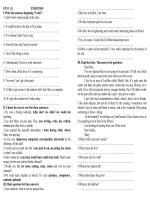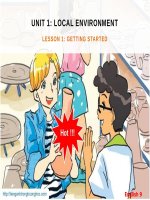English 9: Unit 1: Local Environment
Bạn đang xem bản rút gọn của tài liệu. Xem và tải ngay bản đầy đủ của tài liệu tại đây (1.03 MB, 11 trang )
UNIT 1: LOCAL ENVIRONMENT
LESSON 1: GETTING STARTED
English 9
What does local environment mean?
•
•
local: local means your surroundings
environment: a term that encompasses all living and non-living things occurring
naturally on Earth or some region thereof.
This unit is not about environmental issues such as pollution, deforestation, or global
warming, but it is about the physical conditions in an area such as its features,
traditional crafts, or places of interest.
2
Warm up
conical hat
workshop
pottery
handicraft
3
I. Vocabulary
•
•
•
•
•
•
•
•
•
•
pottery (n) /ˈpɒtəri/
đồ gốm
set up (v)
thành lập
/sɛt/ /ʌp/
workshop (n) /ˈwɜːkʃɒp/
xưởng
take over (v) /teɪk/ /ˈəʊvə/
tiếp quản
attraction (n) /əˈtrækʃ(ə)n/
sự thu hút
conical hat (n) /ˈkɒnɪkəl/ /hæt/
nón lá
remind (v) /ˈrɪmaɪnd/
tưởng nhớ
specific region (n) spɪˈsɪfɪkˈriːʤən
handicraft (n) /ˈhændɪkrɑːft/
look around (n) /lʊk//əˈraʊnd/
khu vực riêng
đồ thủ công
nhìn quanh
4
II. Listen and read
Activity 1. Listen and read.
a.
Can you find a word/phrase that means:
1.
a thing which is skilfully made with your hands
2.
start something (a business, an organisation)
3.
take control of something (a business, an organisation, etc.)
4.
peopletake
whoover
do skilled work, making things with their
5.
an interesting or enjoyable place to go or thing to do
craft
set up
hands
artisans
6.
a particular place
7.
attraction
make
someone remember or think about something
specific region
8.
walk around a place to see what is there
remind
look round
5
Watch out!
‘As far as I know’ is an expression. It is used to say that you think you know something but you
cannot be completely sure, especially because you do not know all the facts.
6
Activity 1. Listen and read.
b.
Answer the following questions.
1.
Where are Nick, Mi, and Phong?
They’re at Phong’s grandparents’ workshop in Bat Trang.
2.
How old is the village?
It is about 700 years old.
3.
Who started Phong’s family workshop?
His great-grandparents did.
4.
Why is the village a place of interest in Ha Noi?
Because people can buy things for their house and
make pottery themselves there
5.
Where is the craft village that Mi visited?
6.
Why do tourists like to buy handicrafts as souvenirs?
It’s in Hue.
Because the handicrafts remind them of a specific region.
7
Activity 2. Write the name of each traditional handicraft in the box under the picture.
A
paintings
E
silk
B
drums
F
lacquer ware
C
D
pottery
marble sculptures
G
conical hats
H
lanterns
8
Activity 3. Complete the sentences with the words/ phrases from 2 to show where in Viet Nam the
handicrafts are made. You do not have to use them all.
1.
The birthplace of the famous bai tho ________ is Tay Ho village in Hue.
2.
conical
If you go to Hoi An on the 15th of each lunar month, you can enjoy the
lightshat
of many beautiful ________
3. Van Phuc village in Ha Noi produces different types of ________ products such as cloth, scarves, ties, and
dresses.
lanterns
4. On the Tet holiday, many Hanoians go to Dong Ho village to buy folk ________.
5. ________ products of Bau Truc, such as pots and vases, have the natural colours typical of Champa culture
silk
in Ninh Thuan
6. Going to Non Nuoc marble village in Da Nang, we’re impressed by a wide variety of ________
paintings
Buddha statues to bracelets.
Pottery
from
marble sculptures
9
Activity 4. QUIZ: WHAT IS THE PLACE OF INTEREST?
a.
Work in pairs to do the quiz.
1.
People go to this area to walk, play, and relax.
2.
It is a place where objects of artistic, cultural, historical, or scientific interest are kept and
park
shown.
3.
People go to this place to see animals.
4.
It is an area of sand, or small stones, beside the sea or a lake.
5.
It is a beautiful and famous place in the countryside.
b.
zoo
Work in groups. Write a similar quiz about places of interest. Ask another group to
answer the quiz.
museum
beach
beauty spot
10
III. Homework
•
•
•
Learn vocabulary by heart.
Redo exercises.
Prepare the next lesson: A closer look 1
11









